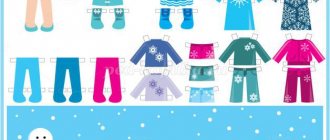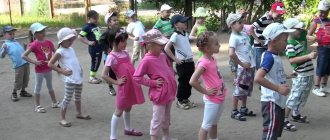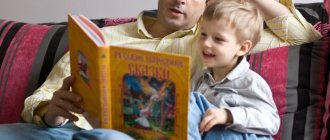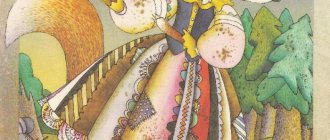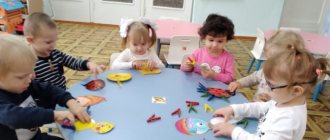Junior group. Early childhood, nursery. Children 1-4 years old
The role of folk tales in the education of young children Folk tales are one of the first literary works that adults introduce children . Works of oral folk art have a special syllable and rhythm. Children perceive fairy tales and love to listen to them many times. Fairy tales are suitable for young children ...
A comprehensive lesson on speech development in the second group of early age “Acquaintance with the Russian folk tale “Turnip”
Goal: read the Russian folk tale “Turnip” to children, introduce them to its characters. Arouse positive emotions from reading. Talk about friendship and interaction, teach how to act together. Fix the names of colors and shapes . Objectives: To develop children's thinking , to activate...
Stories about pets for children 3-4 years old
V. Bianchi “Cat’s Pet”
Our cat had kittens in the spring, but they were taken away from her. Just on this day we caught a small hare in the forest.
We took it and placed it on the cat. The cat had a lot of milk, and she willingly began to feed the bunny.
So the little bunny grew up on cat milk. They became very good friends and even always sleep together.
The funniest thing is that the cat taught the foster bunny to fight with dogs. As soon as the dog runs into our yard, the cat rushes at it and scratches it furiously. And then a hare runs up behind her and drums her front paws so hard that the dog’s fur flies in clumps. All the dogs around are afraid of our cat and her pet hare.
Issues for discussion
• Who did you like more in V. Bianchi’s story: the cat or her pet? Why? Tell me how the cat fed the bunny. How did the cat and the bunny live? What did the cat teach her pet hare? Tell me how the hare defended himself from the dogs. What does the author call the hare in the story “The Cat's Pet”? (Adopted, pet). Why is it called that?
N. Sladkov “Purlyka”
Once upon a time there lived a cat with my grandmother. The cat's name was Purr. More than anything in the world, Purr loved milk.
In the summer the cat respected cold milk. It's like something out of a foggy jar. As soon as grandma gets the jug out of the well, Purr is right there! The tail sticks out and purrs so much that the whiskers rattle.
Drink some cold milk and you're done. Paws up, eyes open - the cold belly warms in the sun.
But in winter, give Murlyka baked milk. First he will eat the foam, then he will lap it up until it drops.
It will steam, relax, and scratch at the door. A hot belly immediately onto the snow - it cools down.
Day and night - a day away. The purr either warms the stomach or cools it. And in his free time he laps up milk. He has no time to catch mice.
Whether long or short, my grandmother died. Murlyka began to live with his grandmother’s granddaughter.
Want to know what he's doing now?
Then look out the window. If it’s summer outside, that means the cat Purr warms the belly, and if it’s winter, it cools it down.
He lives without any pain. Doesn't catch mice. And he purrs so much that his mustache rattles. And the tail is a pipe.
K. D. Ushinsky “Bishka”
“Come on, Bishka, read what’s written in the book!”
The dog sniffed the book and walked away. “It’s not my job,” he says, “to read books; I guard the house, I don’t sleep at night, I bark, I scare thieves and wolves, I go hunting, I keep an eye on the bunny, I look for ducks, I carry diarrhea - I’ll have that too.”
Issues for discussion
• Listen to the story “Bishka” by K. D. Ushinsky. Who is it talking about? How does a dog tell you what it does for a person?
K. D. Ushinsky “Cow”
The cow is ugly, but she gives milk. Her forehead is wide, her ears are to the side; there is a lack of teeth in the mouth, but the faces are large; the ridge is pointed, the tail is broom-shaped, the sides are protruding, the hooves are double. She tears grass, chews gum, drinks swill, moos and roars, calling her mistress: “Come out, mistress; take out the bin, clean toilet! I brought milk and thick cream for the kids.”
L. Voronkova “The Cock’s Word”
The herd was resting near the river, under the willows. The cows stood in the cold, dozing.
But soon the milkmaids came and woke up the cows. The milkmaids saw Vanya and began to ask the grandmother:
- Well, Zakharovna, is this our new milker?
- Or did you come to hire yourself as a shepherd?
“What are you talking about,” answered the grandmother, “this is my granddaughter Vanya.”
The milkmaids joked and laughed, as if they didn’t know that Vanya was his grandmother’s granddaughter.
Then grandma said:
- I'll milk it. And you, Vanya, go to the river and take a swim. Yes, pick a burdock on your head, otherwise the sun will bake you.
Vanya went down to the river. I took a swim. Played with the fish. In a shallow place where the sun warms the water to the bottom, small fish always crowd. If you scare them, they will immediately crumble, scatter like silver arrows. And if you stand quietly in the water, they will gather around your feet again. They are playing.
In the river Vanya picked green sedge. Found it in the bushes
Burdock, put it on his head instead of a hat. And he sat down under the willows. Sits and weaves a whip from sedge.
And the shepherd Uncle Andrei lies right there in the cold, covers his face with a cap and sleeps.
Suddenly something happened. The milk pan rattled, the milkmaid Matryona screamed and began to scold:
- Oh, disgusting! Oh, you are worthless to be eaten by wolves.
And she hit her cow. The cow ran away from her. Runs, snorts, tail like a pipe...
Grandma had just finished milking Buryonka.
- Matryosha, is it possible to beat a cow?
- How can you not beat her? - Matryosha answered with annoyance. “I hit the bucket with my foot and spilled the milk!” And now she’s running - catch her! You won't catch it. And he won’t give milk, he won’t give it for anything. So disgusting!
“It’s not good, it’s not good,” said the grandmother, “we need to sort this out!” She was bitten by a horsefly, she wanted to drive the horsefly away and accidentally hit the bucket. Why scold her? Not on purpose, after all. You need to understand.
Matryosha wanted to approach the angry cow.
- Stop, Pestrushka, stop!
But Pestrushka glanced sideways at her, sniffled and ran away again.
“She doesn’t believe you,” said the grandmother, “she hit you once, you can hit her again.” Let me talk to her.
Grandmother came up to Pestrushka, caressed her, scratched her behind the horns - cows love this very much. Then she took a clean rag from her pocket and wiped the tears from her eyes, because Pestrushka was crying out of resentment.
- Well, that’s all, my little cow, that’s the end of it.
Doru. Don't be angry, don't be offended. Need to be milked. Well, go, Matryosha. Pestrushka is no longer angry with you. And be kind to her.
Matryosha came up, stroked Pestrushka and sat down to milk. The milkmaids surrounded the grandmother.
- Zakharovna, tell us why the cows listen to you?
Then the shepherd Uncle Andrey pulled his cap off his face and said in a sleepy voice:
“She knows a cock’s word.”
- Oh, Zakharovna! - the milkmaids shouted. - Say this word to us too. Is it magical, or what?
“And this word is very simple,” the grandmother answered them. — You need to understand cows, you need to respect them. And most importantly, you have to love them. That's all my magic.
Questions to discuss with children
• What did you learn about the cow from the story of K. D. Ushinsky? What healthy food does a cow give people? What does a cow look like? What does she eat in summer and what does she eat in winter? What is the name of the cow house? What does a cow call its owner? Draw a cow grazing in a meadow
• Tell me where the cow grazes in the summer. Who herds the cows? What does a shepherd do to get the cows to come to him?
K. D. Ushinsky “Goat”
A shaggy goat is walking, a bearded one is walking, waving its faces, shaking its beard, tapping its hooves: it walks, bleats, calling for goats and kids. And the goats and kids went into the garden, nibbled grass, gnawed bark, spoiled young clothespins, hoarded milk for the children; and the kids, little kids, sucked milk, climbed the fence, fought with their horns.
Issues for discussion
Wait, the bearded owner will come and give you all order!
• What did you learn about goats from the story of K. D. Ushinsky? What does a goat look like? What does he call goats with kids? What do goats and kids do in the garden? How do little goats play in the garden? Who is called the bearded owner in the story: a man or a goat?
Works of poets and writers of Russia
Poetry. K. Balmont. "Autumn"; A. Blok. "Bunny"; A. Koltsov. "The winds are blowing." (from the poem “Russian Song”); A. Pleshcheev. “Autumn has come.”, “Spring” (abbr.); A. Maikov. “Lullaby”, “The swallow has rushed .” (from modern Greek songs); Ah, Pushkin. “Wind, wind! You are powerful.”, “Our light, sunshine!”, “A month, a month.” (from “The Tale of the Dead Princess and the Seven Knights”); S. Cherny. “The Preacher”, “About Katyusha”; S. Marshak. “Zoo”, “Giraffe”, “Zebras”, “Polar Bears”, “Little Ostrich”, “Penguin”, “Camel”, “Where the Sparrow Dined” (from the series “Children in a Cage”); “A Quiet Tale”, “The Tale of a Smart Mouse”; K. Chukovsky. “Confusion”, “Stolen Sun”, “Moidodyr”, “Tsokotukha Fly”, “Hedgehogs Laugh”, “Christmas Tree”, “Aibolit”, “Miracle Tree”, “Turtle”; S. Grodetsky, “Who is this?”; V. Berestov. “Hen with Chicks”, “Bull”; N. Zabolotsky. “How the mice fought with the cat”; V. Mayakovsky. “What is good and what is bad?”, “Every page is either an elephant or a lioness”; K. Balmont, “Mosquitoes-Makariki”; P. Kosyakov. "She's All"; A. Barto, P. Barto. “Greasy girl”; S. Mikhalkov. "Song of Friends"; E. Moshkovskaya. "Greedy"; I. Tokmakova. "Bear".
Prose. K. Ushinsky. “Cockerel with his family”, “Ducks”, “Vaska”, “Fox-Patrikeevna”; T. Alexandrova. "Burik the Bear"; B. Zhitkov. “How we went to the zoo”, “How we arrived at the zoo”, “Zebra”, “Elephants”, “How the elephant bathed” (from the book “What I Saw”); M. Zoshchenko. -Smart bird”; G. Tsyferov. “About Friends”, “When There Are Not Enough Toys” from the book “About the Chicken, the Sun and the Little Bear”); K. Chukovsky. “So and not so”; D. Mamin-Sibiryak. “The Tale of the Brave Hare - Long Ears, Slanting Eyes, Short Tail”; L. Voronkova. “Masha the Confused”, “It’s Snowing” (from the book “It’s Snowing”); N. Nosov “Steps”; D, Kharms. "Brave Hedgehog"; L. Tolstoy. “The bird made a nest.”; “Tanya knew the letters.”; “Varya had a siskin.”, “Spring has come.”; V. Bianchi. “Bathing bear cubs”; Yu. Dmitriev. "Blue hut"; S. Prokofiev. “Masha and Oika”, “When you can cry”, “The Tale of an ill-mannered mouse” (from the book “Fairy Tale Machines”); V. Suteev. "Three kittens"; A. N. Tolstoy. “Hedgehog”, “Fox”, “Cockerels”.
List of literature for reading in the 2nd junior group according to the Federal State Educational Standard
An approximate list of reading materials for children in the 2nd junior group.
Russian folklore
Songs, nursery rhymes, chants.
“Finger-boy...”, “Little bunny, dance...”, “The night has come...”, “Magpie, magpie...?,” “I’m going, going to see the woman, to the grandfather...”, “Tili-bom! Tili-bom! ..."; “Like our cat...”, “The squirrel is sitting on a cart...”, “Ay, kachi-kachi-kachi”, “We lived with grandma...”, “Chiki-chik-chikalochka...”, “Little kitty-murysenka...”, “ Zarya-Zaryanitsa..."; “Ant-grass...”, “There are three hens on the street...”, “Shadow, shadow, shady...”, “Rock-hen...”, “Rain, rain, more...”, “Ladybug..,” , "Rainbow-arc...".
Fairy tales.
"Kolobok", arr. K. Ushinsky; “The Wolf and the Little Goats”, arr. A. N. Tolstoy; “Cat, rooster and fox”, arr. M. Bogolyubskaya; "Swan geese"; "The Snow Maiden and the Fox"; “Goby - black barrel, white hooves”, arr. M. Bulatova; "The Fox and the Hare", arr. V. Dahl; “Fear has big eyes”, arr. M. Serova; "Teremok", arr. E. Charushina.
Folklore of the peoples of the world
Songs.
“The Ship”, “The Brave Men”, “Little Fairies”, “The Three Trappers” English, arr. S. Marshak; “What a rumble”, trans. from Latvian S. Marshak; “Buy onions...”, trans. with scotch N. Tokmakova; “Conversation of Frogs”, “Uncooperative Hoopoe”, “Help!” lane from Czech S. Marshak.
Fairy tales.
“Mitten”, “Goat-dereza” in Ukrainian, arr. E. Blaginina; “Two Greedy Little Bears”, Hungarian, arr. A. Krasnova and V. Vazhdaeva; “Stubborn goats”, Uzbek, arr. Sh. Sagdully; “Visiting the Sun”, translated from Slovak. S. Mogilevskaya and L. Zorina; "Nanny Fox", trans. from Finnish E. Soini; “The Brave Well Done”, trans. from Bulgarian L. Gribova; “Pykh”, Belarusian, arr. N. Myalika; “The forest bear and the naughty mouse”, Latvian, arr. Y. Vanaga, per. L. Voronkova; "The Rooster and the Fox", trans. with scotch M, Klyagina-Kondratieva; "The Pig and the Kite", a fairy tale of the peoples of Mozambique, trans. from Portugal Yu. Chubkova.
Works of poets and writers of Russia
Poetry.
K. Balmont. "Autumn"; A. Blok. "Bunny"; A. Koltsov. “The winds are blowing...” (from the poem “Russian Song”); A. Pleshcheev. “Autumn has come...”, “Spring” (abbr.); A. Maikov. “Lullaby”, “The Swallow Has Rushed...” (from modern Greek songs); Ah, Pushkin. “Wind, wind! You are mighty!..”, “Our light, sunshine!.”, “A month, a month...” (from “The Tale of the Dead Princess and the Seven Knights”); S. Cherny. “The Preacher”, “About Katyusha”; S. Marshak. “Zoo”, “Giraffe”, “Zebras”, “Polar Bears”, “Little Ostrich”, “Penguin”, “Camel”, “Where the Sparrow Dined” (from the series “Children in a Cage”); “A Quiet Tale”, “The Tale of a Smart Mouse”; K. Chukovsky. “Confusion”, “Stolen Sun”, “Moidodyr”, “Tsokotukha Fly”, “Hedgehogs Laugh”, “Christmas Tree”, “Aibolit”, “Miracle Tree”, “Turtle”; S. Grodetsky, “Who is this?”; V. Berestov. “Hen with Chicks”, “Bull”; N. Zabolotsky. “How the mice fought with the cat”; V. Mayakovsky. “What is good and what is bad?”, “Every page is either an elephant or a lioness”; K. Balmont, “Mosquitoes-Makariki”; P. Kosyakov. "She's All"; A. Barto, P. Barto. “Greasy girl”; S. Mikhalkov. "Song of Friends"; E. Moshkovskaya. "Greedy"; I. Tokmakova. "Bear".
Prose.
K. Ushinsky. “Cockerel with his family”, “Ducks”, “Vaska”, “Fox-Patrikeevna”; T. Alexandrova. "Burik the Bear"; B. Zhitkov. “How we went to the zoo”, “How we arrived at the zoo”, “Zebra”, “Elephants”, “How the elephant bathed” (from the book “What I Saw”); M. Zoshchenko. -Smart bird”; G. Tsyferov. “About Friends”, “When There Are Not Enough Toys” from the book “About the Chicken, the Sun and the Little Bear”); K. Chukovsky. “So and not so”; D. Mamin-Sibiryak. “The Tale of the Brave Hare - Long Ears, Slanting Eyes, Short Tail”; L. Voronkova. “Masha the Confused”, “It’s Snowing” (from the book “It’s Snowing”); N. Nosov “Steps”; D, Kharms. "Brave Hedgehog"; L. Tolstoy. “The bird made a nest...”; “Tanya knew the letters...”; “Varya had a siskin...”, “Spring has come...”; V. Bianchi. “Bathing bear cubs”; Yu. Dmitriev. "Blue hut"; S. Prokofiev. “Masha and Oika”, “When you can cry”, “The Tale of an ill-mannered mouse” (from the book “Fairy Tale Machines”); V. Suteev. "Three kittens"; A. N. Tolstoy. “Hedgehog”, “Fox”, “Cockerels”.
Works of poets and writers from different countries
Poetry
. E. Vieru. "The Hedgehog and the Drum", trans. with mold. Y. Akima; P. Voronko. "The Sly Hedgehog", trans. from Ukrainian S. Marshak; L. Mileva. "Swift Legs and Gray Clothes", trans. from Bulgarian M. Marinova; A. Milne. "Three Little Foxes", trans. from English N. Slepakova; N. Scored. "Pencil", trans. from Ukrainian 3. Alexandrova; S. Kapugikyan. “Who will finish drinking sooner”, “Masha does not cry” trans. from Armenian T. Spendiarova; A. Bosev. "Rain", trans. from Bulgarian I. Maznina; “The Finch Sings”, trans. from Bulgarian I. Tokmakova; M. Karem. "My cat", trans. from French M. Kudinova.
Prose.
D. Bisset. “The Frog in the Mirror”, translation, from English. N. Shereshevskaya; L. Muur. "Little Raccoon and the One Who Sits in the Pond", trans. from English O. Obraztsova; Ch. Yancharsky. “Games”, “Scooter” (from the book “The Adventures of Mishka Ushastik”), trans. from Polish V. Prikhodko; E. Bekhlerova. "Cabbage Leaf", trans. from Polish G. Lukina; A. Bosev. “Three”, translation, from Bulgarian. V. Viktorova; B. Potter. "Ukhti-Tukhti", trans. from English O. Obraztsova; J. Capek. “A Hard Day”, “Into the Forest”, “Yarinka’s Doll” (from the book “The Adventures of a Dog and a Cat”), trans. . Czech G. Lukina; O. Alfaro. "Hero Goat", trans. from Spanish T. Davityants; O. Panku-Yash. "Good night, Dooku!", trans. from Romanians M. Olsufieva, “Not only in kindergarten” (abbr.), trans. from Romanians T. Ivanova.
Sample list for learning by heart
“Finger-boy...”, “Like our cat...”, “Cucumber, cucumber...”, “Mice dance in a circle...”, Russian Nar. songs; A. Barto. “Bear”, “Ball”, “Boat”; V. Berestov. "Cockerels"; K. Chukovsky. “Christmas tree” (abbr.); E. Ilyina. “Our Christmas tree” (abbr.); A. Pleshcheev. "Rural Song"; N. Sakonskaya. “Where is my finger?”
